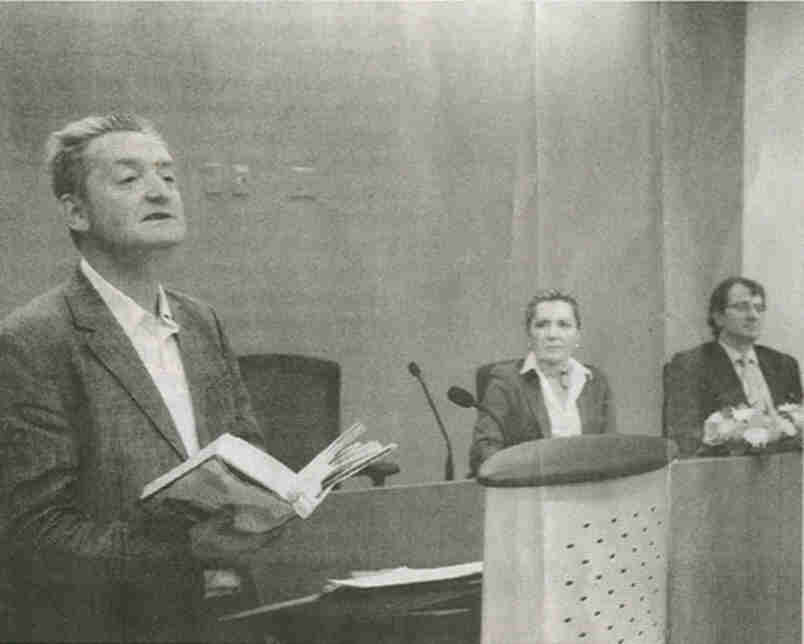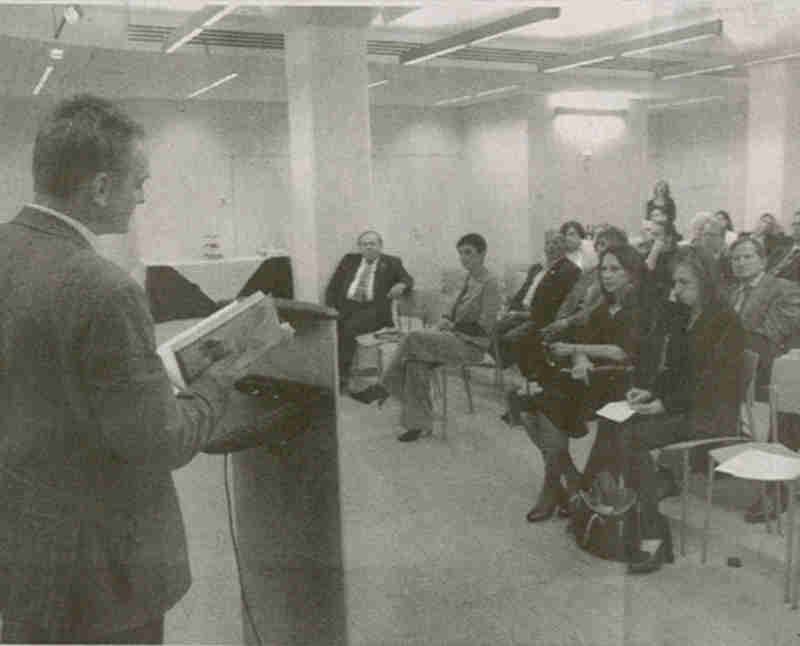 |
|
|
"Paradise Lost" Writer Giles Milton Presents Horror of Smyrna Catastrophe |
|
| By Mark Frangos Special to The National Herald NEW YORK - Giles Milton, the British author of the book "Paradise Lost," a chronicle of the final days of Smyrna before the Smyrna Catastrophe in 1922, spoke to an audience of Greek Americans at an event at the Greek Press Office in New York on Thursday, October 2, 2008. Mr. Milton discussed his research and read passages from the book as spectator listened to the horrors that many Greeks endured during the days before, during and after the fire had destroyed the once proud arid cosmopolitan city of Smyrna. One of the more emotional moments was when Mr. Milton discussed Metropolitan Chrysostomos' reaction to the arrival of Greek troops in Smyrna in May of 1919. |
 "Paradise Lost" author Giles Milton reads an excerpt from his book during an event at the Greek Press Office in New York on Thursday October 2, 2008 Behind him is Greek Consul General Aglaia Balta |
"Metropolitan Chrysostomos, robed in full church vestments, stepped forward to bless the troops and wish them success," Mr. Milton read. "'With tears in his eyes,' wrote the Greek, author Phanis Kleanthis, 'Chrysostomos kneeled down, embraced the glorious flag of the regiment and gave it his blessing.' For the metropolitan, it was the happiest moment of his life.'" Shortly after the Turkish army overran Smyrna on September 9, 1922, Metropolitan Chrysostomos was brutally tortured and killed. Mr. Milton was joined on stage by the Greek Consul General to New York, Aglaia Balta. Ms. Balta introduced Mr. Milton by quoting American Civil War General, Robert E. Lee "What a cruel thing is war: to separate and destroy families and friends, and mar the purest joys and happiness God has granted us in this world; to fill our hearts with hatred instead of love for our neighbors, and to devastate the fair face of this beautiful world," Ms. Balta said quoting General Lee. Ms. Balta then introduced Mr. Milton and his book. "Today, I am honored to present to you a book about the cruelty of war and its devastating consequences not so much on national pride, as on the people in the midst of it, who are its ultimate victims," she said. "In "Paradise Lost", eyewitness testimonies, diary entries, and letters - some of them published for the first time - are all part of a meticulously researched, informed account of the devastating destiny of the city of Smyrna and its people." |
|
|
In "Paradise Lost," eyewitness testimonies, diary entries, and letters - some of them published for the first time - are all part of a meticulously researched, informed account of the devastating destiny of the city of Smyrna and its people. |
 Mr. Milton reads to an interested audience |
|
One thing that Mr. Milton made sure to stress was that he does not agree with the revisionist historians who claim that the Turks did not set fire to the city and it was either the Greek, Armenians or some unknown reason. "Without a doubt in my mind," he said. "The Turkish army set Smyrna on fire." Mr. Milton wrote this book after reading about Smyrna while doing research for a character in a fiction novel he had written. He found the subject matter interesting and continued his research. "Smyrna contained at twice as many Greeks as lived in Athens at the time," he said. "There were 11 Greek newspapers available in the city, as well as seven in Turkish, five in Armenian, four in French and five in Hebrew. It was a very cosmopolitan city, where at the end of the 19th century, Greeks, Armenian, Jews and Turks lived harmoniously together. Turks of the mainland Ottoman Empire used to call it 'The City of the Infidels.' People in the United States and Britain don't know enough about Smyrna and that's why I decided to write this book." |
|
|
(Posting date 20 October 2008) HCS encourages readers to view other articles and releases in our permanent, extensive archives at the URL http://www.helleniccomserve.com/contents.html. |
|
|
|
|
2000 © Hellenic Communication Service, L.L.C. All Rights Reserved.
http://www.HellenicComServe.com |
|
